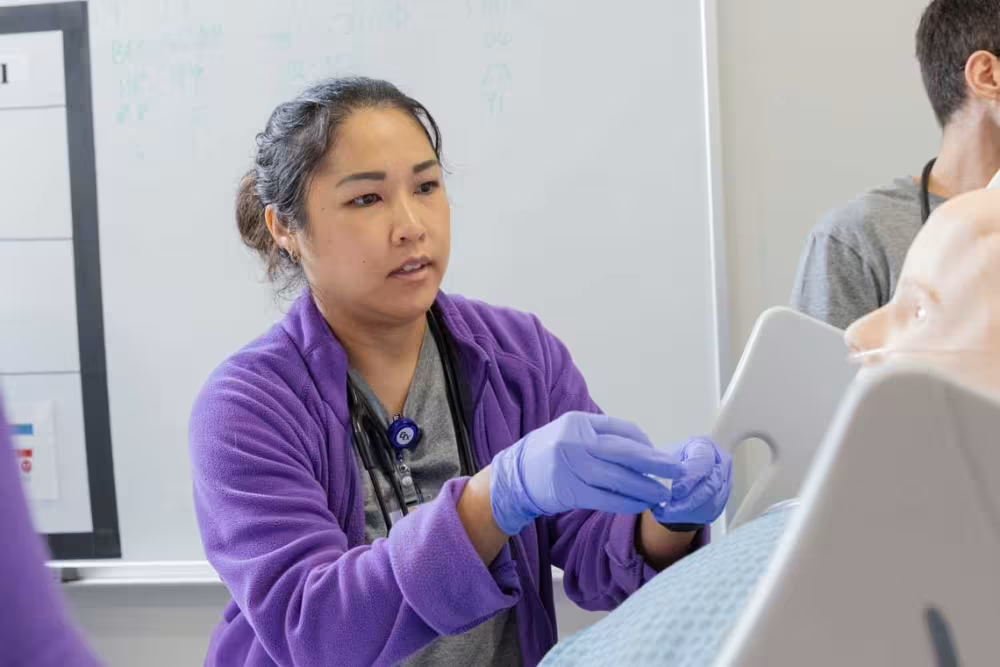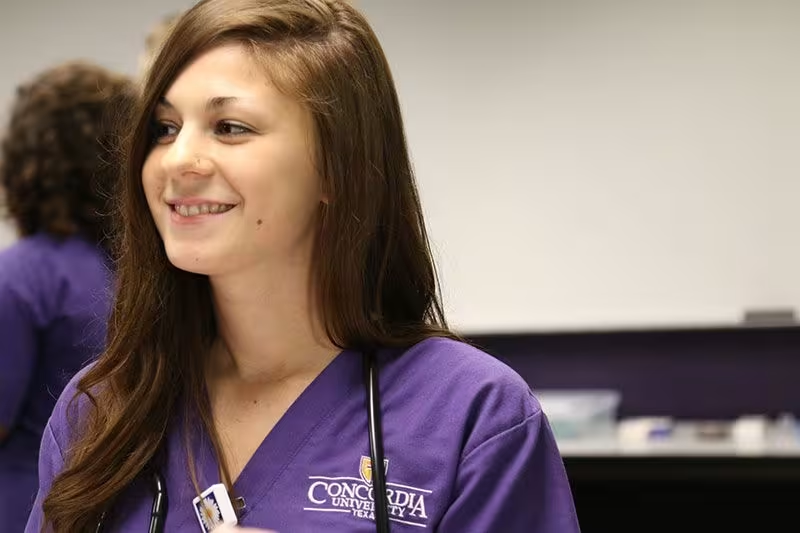How to Prepare for Nursing School: 8 Essential Tips for Success
Each blog post is dated and contains accurate information as of that date. Certain information may have changed since the blog post publication date. If you would like to confirm the current accuracy of blog information, please visit our ABSN overview page or contact admissions at (866) 891-1371.
Wondering how to prepare for nursing school? There are a number of steps you can take, starting with learning more about what to expect from nursing school. You can also improve your study habits and time management skills, care for your health, and study nursing terminology.

You’re ready to move forward with nursing school to earn your Bachelor of Science in Nursing (BSN) degree. While it is an exciting time, it can also feel overwhelming. After all, nursing school is a significant investment, and it’s important to know how to prepare for nursing school so you can position yourself for success.
Concordia University Texas’s Accelerated Bachelor of Science in Nursing (ABSN) track is designed to prepare future nurses to deliver exceptional patient care and serve as leaders in their healthcare facilities. We take to heart the necessity of delivering a rigorous curriculum that prepares our students to tackle any challenge in nursing.
It will take hard work to be successful in nursing school, but you’ll have the support of our nursing instructors and Academic Success Coaches.
Remember that you will face various challenges as you begin nursing school, and it may take some time to iron out the details of your routine. While there is no fixed formula for success in nursing school, there is a common framework to guide your approach.
It starts with understanding the expectations of nursing school, including the challenges you’ll face. You should also take some time to review your study habits, build a support network, and start studying nursing terminology ahead of time.
1. Understand the Expectations of Nursing School
The Concordia Texas ABSN track can be completed in as few as 16 months after successfully completing any needed prerequisite courses. Because of that compressed timeline, the pace of the curriculum is intense.
The nursing curriculum can be broken down into three categories:
- Nursing Coursework: Your coursework establishes the foundation for building your nursing skills. At Concordia Texas, coursework is offered online through an interactive e-learning platform, allowing you to work where and when it’s most convenient, provided you meet deadlines.
- Nursing Labs: You will participate in two types of in-person labs: skills labs and simulation labs. Skills labs allow you to practice core skills, such as wound care, on high-tech manikins. Simulation labs are where you and your peers participate in mock clinical scenarios with high-tech manikins as your patients.
- Clinical Rotations: You will work in various clinical settings, providing real-world patient care under the supervision of your preceptors and healthcare staff. This is where you’ll learn what it’s like to work as a nurse and network with healthcare providers.
In short, you will be challenged when you enter the ABSN track. Even if you were a biology major in college, you’ll still have a learning curve to navigate as you transition to nursing school. That is normal, so be patient and give yourself time to adjust.
When feeling challenged, remember to reach out to Academic Success Coaches and your instructors for guidance and advice. You could also rely on your peers for support as you navigate nursing school together.

Is nursing school hard? Learn what to expect.
2. Develop Effective Study Habits
Adaptation is key. It’s important to figure out which learning strategies work for you. Remember that interactive studying is far more effective than simply reading a textbook, no matter what specific methods you use.
You must study frequently throughout nursing school. Before you start, it can be helpful to identify which study methods have worked best for you in the past. In nursing school, you will need to use methods that apply the information you’ve gained from coursework materials and the experience gained from labs and clinicals. Try study methods such as:
- Summarizing in your own words
- Using flashcards
- Rephrasing information in a way so simple that a child could understand it
- Using the SQ3R technique

3. Establish a Routine for Better Time Management
Don’t wait until you start nursing school to work on your time management. Right from the first day, you’ll have a heavy workload. Part of knowing how to prepare for nursing school is improving your time management skills now.
For example, start by identifying the biggest time-wasters in your day. Look for ways to streamline your daily routine to free up more time for nursing school. If you’re a procrastinator, try using the Pomodoro Technique.
Here are some specific ways to use a routine to your advantage to succeed in nursing school:
- Wake up and go to bed at the same time each day.
- Have set times for studying your online coursework.
- Study frequently on most days of the week instead of cramming.
- Set aside specific time on the weekends to study.
- If you like to work out, set aside consistent time each day.
- Plan your study time based on your strengths. For example, if you focus better at night, plan for an evening study routine.
- Schedule extracurriculars and other activities at times that don’t interfere with your prime study hours.

4. How to Survive Nursing School With a Strong Support Network
A support system is vital to your accelerated nursing school success. Loved ones are often encouraging in difficult times, so keep them involved in your day-to-day life.
Your support network should also include your nursing instructors and cohort, as well as your loved ones and community. A good network can help you navigate the challenges of nursing school, while professional connections can act as references and help you throughout your career.
5. Remember Your Why
When you get home late and exhausted after a long day of clinicals and still need to study, you must cling to your why. Your passion for nursing stems from somewhere. Remember that reason and use it as fuel to reach your goal. Sometimes it helps to have a more specific goal, such as “I will become an oncology nurse specializing in pediatric cancer patients,” instead of “I want to become a nurse.”
Learn why cultural competence in nursing is very important, as it contributes to better patient care.

6. Take Care of Your Physical and Mental Well-Being
Students are sometimes so focused on how to be successful in nursing school that they abandon other aspects of their lives. It’s important to remember to care for yourself mentally, physically, and emotionally during nursing school. Your self-care activities should ideally start before starting school, as it takes time to establish consistent habits.
Here are some ways to nurture balance in your life:
- Eat healthy
- Exercise
- Go outside
- Play with your pet
- Talk to a counselor
- Take care of your health needs (i.e. doctor visits)
7. How to Prepare for Nursing School by Studying Nursing Terminology
When you start nursing school, you’ll have to memorize terminology in a short period of time. It’s helpful to prepare by studying nursing terminology, lingo, and acronyms in advance.
Many online resources are available, such as NurseJournal’s nursing terms guide. Start by choosing three or four terms or acronyms to focus on per day, gradually building your knowledge base.

8. Master Test-Taking Strategies to Prep for the NCLEX
Although you’ll take the NCLEX-RN after graduation, it never hurts to begin preparing early. Before starting school, you might want to familiarize yourself with the basic format of the test and the types of questions you’ll find on it. As you enter nursing school, start answering practice questions and taking full-length practice tests.
Use the following test-taking strategies:
- Read each question carefully.
- Know that multiple answers can be correct. You’ll want the most appropriate answer.
- Identify keywords like first, initial, or best to determine the correct answer.
- Focus on nursing responses that meet patient needs.
Begin Your Nursing Education Today
There are many methods for learning how to survive nursing school. At Concordia University Texas, we believe you have what it takes to excel, and we’ll support you with one-on-one coaching and other support resources.
If you haven’t already applied to the ABSN track, then reach out to us today by contacting an admissions counselor to learn more.
